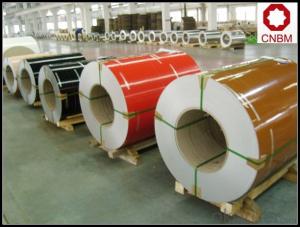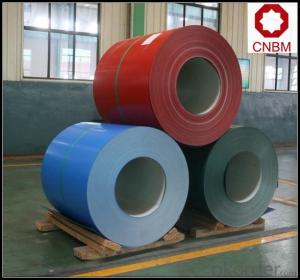Pre-painted Advertisement Boards and Traf Aluminum Coil
- Loading Port:
- Shanghai
- Payment Terms:
- TT OR LC
- Min Order Qty:
- 5 m.t.
- Supply Capability:
- 10000 m.t./month
OKorder Service Pledge
OKorder Financial Service
You Might Also Like
Item specifice
1. Specification of Pre-painted Advertisement Boards and Traf Aluminum Coil
Alloy: 1050, 1060, 1100, 3003, 3004, 3005, 3105, 5005, 5052, 5083, 5754
2) Temper: Various status
3) Thickness: 0.3-150mm
4) Width: 300-1950mm
5) Length: Under9500mm/ Coil
6) Weight: 2.5-5.0 tons per coil
7) Dimensions and weight can be produced according to clients' specifications.
8) Inner Diameter: 505mm, 605mm
9) Packing: Export standard, wooden pallet.
10) Delivery time: 20 days
11) Minimum order quantity: 5 tons per size.
12) The term of payment: T/T, irrevocable L/C at sight.
13) Surface: Bright
14)Origin: China
2. Application of Pre-painted Advertisement Boards and Traf Aluminum Coil
(1).Interior: wall cladding, ceilings, bathrooms, kitchens and balconies, shutters, doors...
(2).Exterior: wall cladding, facades, roofing, canopies, tunnels,column covers , renovations...
(3).Advertisement: display platforms, signboards, fascia, shop fronts...
3. Feature of Pre-painted Advertisement Boards and Traf Aluminum Coil
*Such coil is specially designed to replace aluminum ingot, due to the high export tax of aluminum ingot, the coil has better price than ingot.
*This type of coil can fit customer's remelting furnace just like ingot, no need to make any change to the production line that was previously used for ingot. The standard coil size and weight is very suitable for the feed gate of furnace.
*This type of coil causes less material wastage than ingot when remelted.
*Our coil is made directly from ore, no need to go though the ingot making process, quality is much better than other suppliers who use ingot scrap to make coil.
Be free from Oil Stain, Dent, Inclusion, Scratches, Stain, Oxide Dicoloration, Breaks, Corrosion, Roll Marks, Dirt Streaks and other defect which will interfere with use
4. Certificate:
SGS and ROHS(if client request, paid by client), MTC(plant provided), Certificate of Origin(FORM A, FORM E, CO), Bureau Veritas and SGS (if client request, paid by client), CIQS certificate
5. Image of Pre-painted Advertisement Boards and Traf Aluminum Coil
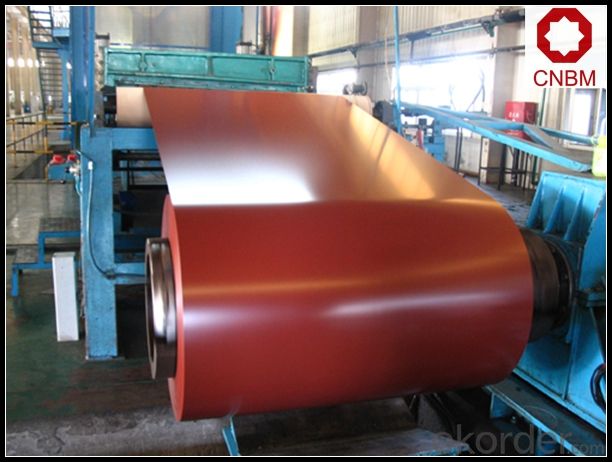
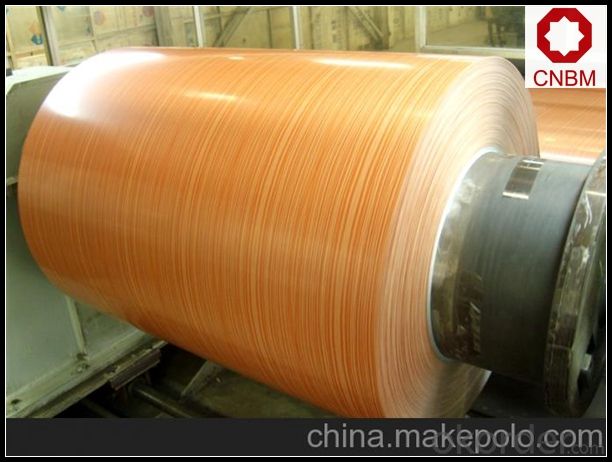
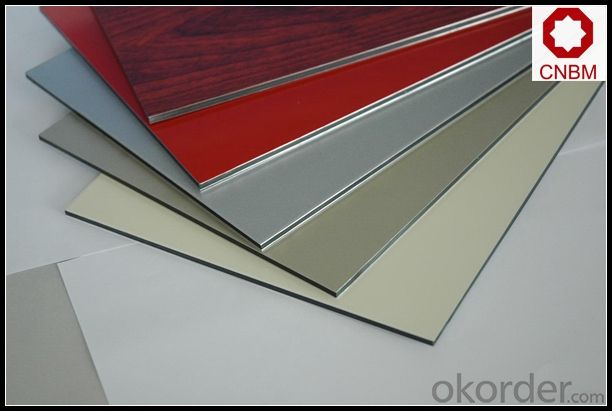
6. Package and shipping of Pre-painted Advertisement Boards and Traf Aluminum Coil
eye to wall
eye to the wall
with wood pallet (wooded case also available)
7. FAQ
1) What is the delivery time?
Dpends on actual order, around 20 to 35 days
2)What is the QC system:
We have QC staff of 20 persons and advanced equipment, each production is with MTC traced from Aluminum ingot lot.
3) What market do you mainly sell to?
Australia, America, Asia, Middle East, Western Europe, Africa etc
- Q:What happens when you mix Aluminum (or magnesium) with calcium carbonate? Can you write a chemical equation please?
- 2Al + 3CaCO3 = Al2(CO3)3 + 3Ca
- Q:Can aluminum coils be used in packaging industries?
- Yes, aluminum coils can be used in the packaging industry. Aluminum is a popular choice for packaging materials due to its numerous advantageous properties. It is lightweight, durable, corrosion-resistant, and has excellent thermal conductivity. These qualities make aluminum coils suitable for various packaging applications, such as food and beverage packaging, pharmaceutical packaging, and cosmetic packaging. Additionally, aluminum is highly recyclable, making it an environmentally friendly choice for the packaging industry. Overall, aluminum coils offer excellent performance and versatility, making them a suitable option for packaging industries.
- Q:What are the dimensions of an aluminum coil?
- The intended use and manufacturing specifications of an aluminum coil can lead to variations in its dimensions. Typical dimensions for an aluminum coil typically fall within a range of 0.2mm to 8mm in thickness and 200mm to 2000mm in width. As for length, it can vary and is usually customized to meet the specific requirements of the customer. Furthermore, the weight of an aluminum coil is subject to change based on its thickness and dimensions.
- Q:We have all heard the Us saying aluminum and their euro counterparts saying aluminium. I assumed this was just a small difference in culture or location. But, while reading my chemistry book (Chemistry the Central Science 12th) i came across a section saying: Cations formed from nonmetal atoms have names that end in -ium: NH4+ ammonIUM ion, H3O+ hydronIUM ion. So, i have came up with a hypothesis, could it be possible that when the periodic table was coming together, the aluminium was changed to aluminum to allow the rules to work? Thus making aluminum the correct spelling? Give me your thoughts.
- It just depends on which side of the Atlantic Ocean you live. Come to think of it though, most metals end in ium. Not just the ions.
- Q:How are aluminum coils protected against galvanic corrosion?
- Aluminum coils are protected against galvanic corrosion through a combination of surface treatments and protective coatings. One common method is the application of a thin layer of anodization on the aluminum surface. Anodization involves electrolytically treating the aluminum with an acid solution, which creates a protective oxide layer on the surface. This oxide layer acts as a barrier, preventing the direct contact between the aluminum and other metals that may cause galvanic corrosion. Another method is the use of a protective coating, such as a polymer or paint, on the aluminum coils. These coatings provide a physical barrier between the aluminum and the environment, preventing the exposure of the metal to corrosive elements. The coatings are carefully selected to have good adhesion to the aluminum surface and excellent resistance to corrosion. In addition to surface treatments and coatings, proper design and material selection also play a crucial role in protecting aluminum coils against galvanic corrosion. By ensuring that dissimilar metals are not in direct contact and using compatible materials, the risk of galvanic corrosion can be minimized. This can be achieved through the use of isolation materials, such as gaskets or insulating tapes, to separate the aluminum coil from other metals in contact. Regular maintenance and cleaning also contribute to the protection against galvanic corrosion. It is important to remove any accumulated dirt, debris, or corrosive substances from the aluminum coils to prevent the formation of localized corrosion cells. Overall, a combination of surface treatments, protective coatings, proper design, and regular maintenance are essential in protecting aluminum coils against galvanic corrosion. These measures help to extend the lifespan and maintain the performance of the coils in various applications.
- Q:what is the hardness number of aluminium.....? what is the hardness number of aluminium-Sic composite material...?
- I don't believe that Aluminum (US spelling)/ Aluminium (UK spelling) has a Mohs Hardness rating. The Hardness of a material, as measured by the Mohs Hardness scale, is a criterion of its resistance to crushing. [Perry's Chemical Engineering Handbook]. Since aluminum is a metal, and would deform under a crushing-type stress, rather than shatter, it would not have a Mohs Hardness rating. Perhaps you meant **aluminA**, rather than aluminum. Alumina (Al2O3) has a Modified Mohs Hardness of 12. Silicon Carbide (carborundum) has a Modified Mohs Hardness of 13. There's no value listed for the combination, but it should be pretty hard stuff -- likely in the 12-13 range, but potentially even harder. Hope that helps.
- Q:Can kerosene lubricate and cool aluminum coil when continuous punch?
- Yes, because water and oil are not solute, but they will emulsificate.
- Q:What are the common sizes of aluminum coils?
- The specific industry and application determine the varying common sizes of aluminum coils. However, different industries commonly utilize certain standard sizes. In the construction field, aluminum coils typically have a thickness ranging from 0.018 inches to 0.032 inches and can be as wide as 60 inches. These coils find their purpose in roofing, siding, and gutter applications. In the automotive sector, aluminum coils are frequently employed in the production of body panels and structural components. The sizes of these coils can greatly differ, varying from thin strips for small parts to larger coils with widths of up to 72 inches for bigger components. The packaging industry utilizes aluminum coils to manufacture foil products, including food packaging and industrial packaging. The thickness of these coils can range between 0.00017 inches and 0.0005 inches, while the widths commonly fall between 12 inches and 24 inches. It is important to acknowledge that these examples represent only a selection of common sizes, and specific applications may necessitate customized aluminum coil sizes. Furthermore, manufacturers possess the capability to produce coils in various dimensions to meet the specific requirements of their customers.
- Q:Can aluminum coils be used in food processing equipment?
- Indeed, food processing equipment can utilize aluminum coils. The numerous advantageous properties of aluminum make it a favored option for food-related applications. Its lightweight nature, resistance to corrosion, and exceptional thermal conductivity render aluminum coils appropriate for deployment in refrigerators, freezers, ovens, and heat exchangers within the realm of food processing equipment. Furthermore, aluminum is non-toxic and does not interact with food, thereby establishing it as a secure material for direct interaction with consumable items. Nevertheless, it remains crucial to verify that the aluminum employed in food processing equipment adheres to the requisite food safety standards and regulations, thereby averting any potential contamination.
- Q:How are aluminum coils used in the production of beverage cans?
- Aluminum coils play a crucial role in the production of beverage cans. These coils are essentially flat, thin sheets of aluminum that are wound into a coil shape. Firstly, the aluminum coils are unwound and fed into a machine that coats them with a thin layer of a protective material, usually a polymer. This coating helps prevent the aluminum from reacting with the beverage and affecting its taste or quality. Next, the coated aluminum coils are passed through a series of rollers that gradually shape them into a cylindrical form. This process is known as cupping, where the flat coil is transformed into a cup-like shape. This cup will eventually become the body of the beverage can. Once the cups are formed, they are trimmed to the correct height and diameter. The excess aluminum is recycled to minimize waste. The cups are then cleaned and rinsed to remove any contaminants. After cleaning, the cups are passed through another machine that applies a liquid compound to their inner surface. This compound acts as a barrier between the aluminum and the beverage, preventing any potential reactions or contamination. Following this, the cups are shaped into the final can body by being pressed between a top and bottom mold. The molds are designed to give the cans their characteristic shape and ridges. Any excess aluminum is trimmed off, and the cans are once again cleaned to ensure their purity. Finally, the cans are sent for filling with the desired beverage, sealing, and labeling processes before being packaged and shipped for distribution. In summary, aluminum coils are used in the production of beverage cans by providing the raw material from which the cans are made. Through a series of processes including coating, cupping, shaping, and cleaning, the aluminum coils are transformed into the final can bodies. These cans are then filled, sealed, and labeled before they are ready for consumption.
1. Manufacturer Overview |
|
|---|---|
| Location | |
| Year Established | |
| Annual Output Value | |
| Main Markets | |
| Company Certifications | |
2. Manufacturer Certificates |
|
|---|---|
| a) Certification Name | |
| Range | |
| Reference | |
| Validity Period | |
3. Manufacturer Capability |
|
|---|---|
| a)Trade Capacity | |
| Nearest Port | |
| Export Percentage | |
| No.of Employees in Trade Department | |
| Language Spoken: | |
| b)Factory Information | |
| Factory Size: | |
| No. of Production Lines | |
| Contract Manufacturing | |
| Product Price Range | |
Send your message to us
Pre-painted Advertisement Boards and Traf Aluminum Coil
- Loading Port:
- Shanghai
- Payment Terms:
- TT OR LC
- Min Order Qty:
- 5 m.t.
- Supply Capability:
- 10000 m.t./month
OKorder Service Pledge
OKorder Financial Service
Similar products
New products
Hot products
Hot Searches
Related keywords
